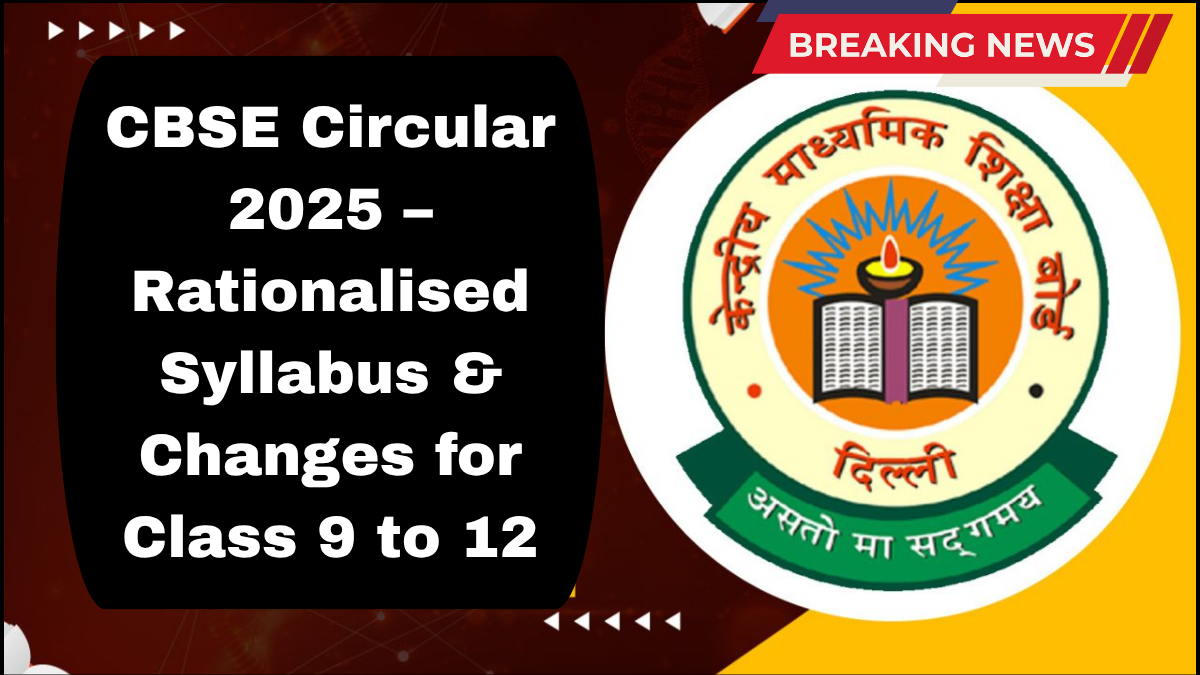The CBSE Circular 2025 marks a pivotal shift in school education for Classes 9 to 12. With a sharp focus on syllabus rationalisation, the Central Board of Secondary Education aims to align the curriculum with the National Education Policy (NEP) 2020, reduce academic stress, and make learning more competency-based.

Here’s a complete breakdown of what’s changing and what students, parents, and educators should know.
What the CBSE Circular 2025 is All About
The CBSE Circular 2025 is not just a routine update—it’s a strategic overhaul of the academic framework. Released in early 2025, this circular communicates essential changes to the syllabi for Classes 9 through 12, intending to:
-
Enhance conceptual clarity
-
Reduce redundancy in academic content
-
Introduce interdisciplinary learning
-
Emphasize real-life applications of knowledge
The syllabus rationalisation process has been carefully undertaken by academic committees, subject matter experts, and educators to ensure that the updated curriculum remains rigorous yet student-friendly.
Major Changes in Curriculum Structure
Class 9 and 10 – Foundation Building with Focused Learning
For Classes 9 and 10, the revised syllabi are designed to strengthen foundational knowledge while streamlining content that overlaps across grades or has limited practical relevance.
Key Highlights:
-
Chapters with repetitive themes have been merged or removed.
-
Greater emphasis on experiential learning and critical thinking.
-
Integration of environmental sustainability and digital literacy in subjects like Science and Social Science.
-
Refined language syllabi (Hindi, English) with updated literature and more contextual grammar exercises.
Class 11 and 12 – Depth Over Breadth
The senior secondary curriculum has been reshaped to reflect the need for deeper subject mastery and future readiness.
Key Highlights:
-
Reduction in rote-heavy topics in subjects like Physics, Chemistry, History, and Accountancy.
-
Business Studies and Economics now include case-based questions that mirror real-world scenarios.
-
Mathematics syllabus trimmed for overlapping concepts while increasing the weightage of applications and data analysis.
-
Introduction of modular assessments in subjects like Political Science and Sociology to test analytical skills rather than mere recall.
What’s New in Assessment and Exams
The CBSE Circular 2025 goes beyond just syllabus tweaks—it also redefines how learning is evaluated.
-
Competency-Based Questions: Increased weightage to application-oriented and analytical questions across subjects.
-
Internal Assessment: Standardized rubrics for project work, practicals, and internal marks to ensure consistency across schools.
-
Reduced Exam Pressure: Smaller curriculum = less stress, with focus on quality learning rather than quantity.
Why the Syllabus Rationalisation Matters
The aim is not to simplify education, but to make it more meaningful and effective. Here’s why the syllabus rationalisation in the CBSE Circular 2025 is a crucial step forward:
-
Clarity over Clutter: Trimming down content allows students to grasp core concepts better.
-
Holistic Development: With space cleared in the syllabus, students can now engage more with sports, arts, and life skills.
-
Aligned with NEP 2020: The changes reflect the long-term vision of creating a learner-centric, flexible education system.
-
Digital Shift Ready: Updated curriculum now includes digital tools, AI fundamentals, and media literacy, preparing students for future careers.
Implementation Timeline and Guidelines
-
All CBSE-affiliated schools are required to implement the new syllabus from the academic session 2025–26.
-
The CBSE website has published revised subject-wise syllabi, assessment structures, and teacher orientation modules.
-
Schools are encouraged to conduct orientation sessions for parents and students to ensure a smooth transition.
Action Points for Students and Teachers
For Students:
-
Go through the updated syllabus on the official CBSE site.
-
Focus on understanding rather than memorizing.
-
Practice with case-based and competency-based sample questions.
For Teachers:
-
Revise lesson plans to match the new structure.
-
Use interactive teaching aids and technology to deepen engagement.
-
Stay updated with CBSE training modules and webinars.
FAQs on CBSE Circular 2025
Q1: Where can I access the updated syllabus mentioned in the CBSE Circular 2025?
You can find the revised syllabus for all classes and subjects on the official CBSE website under the ‘Curriculum 2025–26’ section.
Q2: What are competency-based questions as per the new guidelines?
These are application-oriented questions that test a student’s understanding, problem-solving, and decision-making skills rather than simple recall.
Q3: Has the syllabus been reduced for all subjects?
Yes, most subjects across Classes 9 to 12 have seen reductions or restructuring to eliminate redundant or outdated content.
Q4: Will board exams be easier due to the syllabus rationalisation?
Not easier, but more focused. Exams will now test depth of understanding and application, not just surface-level knowledge.
Q5: Are there any changes to internal assessments?
Yes, CBSE has introduced standardized criteria and expects schools to follow them strictly to maintain fairness and transparency.
click here to learn more